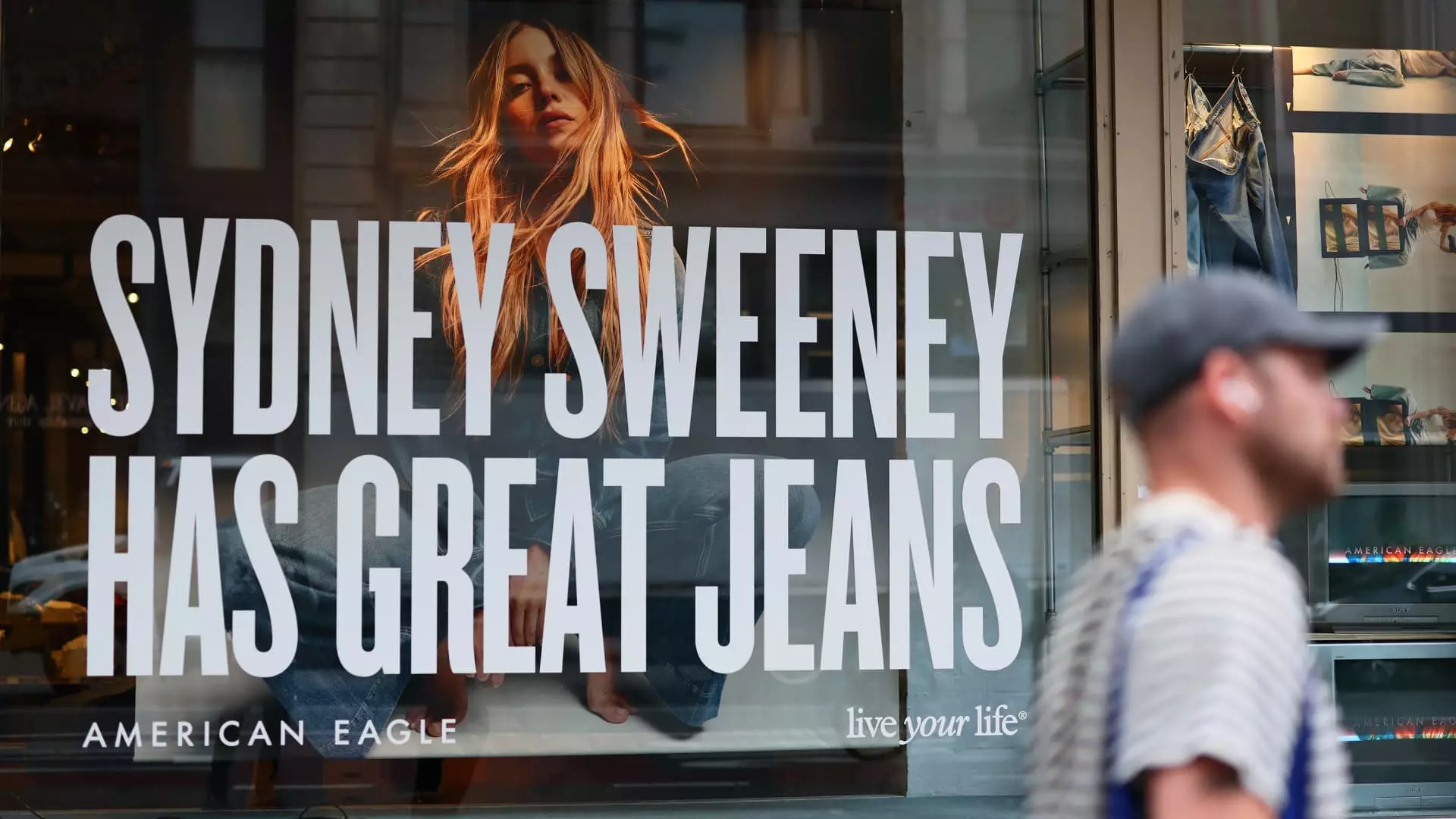In today’s hyper-connected world, the influence of celebrity endorsements—be they through social media, political personalities, or pop culture icons—cannot be overstated. American Eagle’s recent marketing push featuring Sydney Sweeney is a case worth dissecting for anyone interested in the subtle mechanics of modern branding. While initially perceived as a straightforward effort to boost sales, it swiftly transformed into a battlefield of cultural discourse, demonstrating how corporate actions are increasingly intertwined with the ideological currents of society. The surge in American Eagle’s stock price following former President Donald Trump’s public praise underscores a powerful, if complex, truth: in the current market landscape, alignment with certain cultural or political figures can serve as a catalyst, amplifying brand visibility and consumer interest—at least temporarily.
However, this is a double-edged sword. American Eagle’s campaign, which was designed to resonate with a broad, fashion-conscious demographic, instead ignited controversy partly because of its perceived sexualization and cultural insensitivity. Critics argued that the slogan “Sydney Sweeney has great jeans” crossed a line of appropriateness, veering into double entendres that many viewed as a tacit nod to beauty standards rooted in specific racial and aesthetic ideals. Such missteps reveal the precariousness of trying to navigate cultural sensitivities nowadays. Companies risk alienating significant segments of their potential customer base when they fail to anticipate or effectively manage the social implications of their marketing.
The swift backlash—and the subsequent rallying around the brand after Trump’s endorsement—highlight how public sentiment can rapidly shift. Donald Trump’s social media presence, often seen as provocative and polarizing, unexpectedly elevated American Eagle’s profile. It demonstrates the intertwined nature of politics and commerce, where endorsements from political figures, whether credible or contentious, can propel brands into the limelight with minimal effort and maximum immediate impact. Yet, relying on such tactics is inherently unstable. What works as a quick boost may also create long-term risks, including damage to brand integrity and alienation of key demographics.
The Culture War and Consumer Loyalty in a Changing Marketplace
Modern consumers are increasingly vigilant about the brands they support. The rise of “woke” marketing—perceived as authentic when done right, but often dismissed as virtue signaling or pandering—has set a high bar for corporate cultural engagement. In this regard, American Eagle’s decision to sidestep overt political correctness in favor of a more conservative, perhaps traditionally appealing campaign, reflects a strategic attempt to appeal to a demographic that feels increasingly displaced by what is often characterized as “woke” culture.
This shift highlights a broader trend: many brands are recalibrating their messaging to align with a center-right cultural perspective, recognizing that a significant portion of their consumer base may view progressive messaging as either disconnected or excessively politicized. The fallout from Bud Light’s recent fiasco with Dylan Mulvaney exemplifies how quickly woke marketing can backfire when perceived as superficial or out of touch. Conversely, American Eagle’s campaign, by seemingly embracing a traditional, straightforward message, positions itself as a staple of “common sense” branding—one that values simplicity and familiarity over fashionable social justice tropes.
This approach reflects a pragmatic recognition that loyalty isn’t solely driven by social advocacy but increasingly by brand consistency and perceived authenticity. American Eagle’s strategy to emphasize “great jeans” and celebrate individual confidence—without overcomplicating or politicizing the message—aims to fill a perceived gap in the market. They are betting that consumers who feel alienated by the excesses of modern “woke” marketing will respond positively to a less woke, more straightforward appeal.
Yet this positioning is fraught with its own perils. The cultural battle lines are drawn sharply, and switching between progressive and conservative messages can be perilous if not handled with nuance. American Eagle’s silence on the controversy over their slogan exemplifies a cautious stance—neither capitulating nor openly defending. It’s a delicate dance that reflects a broader tension in the market: how far can brands go in adopting traditionalist messaging before they risk being seen as out of touch or pandering to reactionary sentiments?
Strategic Imperatives in a Volatile Economic Environment
Beyond cultural considerations, American Eagle faces a stark macroeconomic reality. The retailer’s struggles with declining sales, inventory missteps, and a volatile economic climate have left it scrambling for effective growth strategies. The marketing campaign featuring Sweeney was clearly part of this effort—an attempt to rekindle consumer interest amid declining revenues and shrinking margins.
The company’s financial report reveals a company in distress, with falling revenue forecasts, increased discounting, and inventory write-downs signaling deeper structural challenges. Market sentiment, reflected in its year-to-date stock decline, attests to investor wariness. Initiatives like leveraging celebrity endorsements—especially those aligned with conservative cultural values—are tactical moves aimed at stabilizing or even reversing this downward trend.
The question remains whether this campaign will translate into sustained financial gain or simply provide a temporary fix. Real shifts in consumer behavior require more than clever slogans or endorsements; they demand consistent messaging, product innovation, and responsiveness to cultural shifts. If American Eagle’s strategy remains rooted in superficial appeals without addressing underlying issues like product relevance or experience, its recent surge will prove fleeting.
Ultimately, the American Eagle saga illustrates the crucial importance of authentic positioning within the current cultural and political climate. It’s a reminder that brands are now inherently political entities, whether they like it or not. Those that can navigate this landscape with polish and authenticity—balancing the marketed image with genuine understanding of their audience—stand the best chance of enduring the turbulence. Conversely, those that ignore the subtle currents of cultural sentiment risk missteps with potentially devastating consequences.

